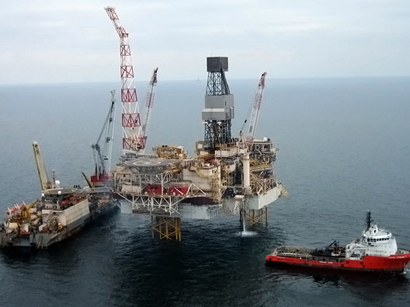BP expects gas output from Shah Deniz to remain high

BP expects production from Azerbaijani Shah Deniz field to
continue at high level in 2016, BP’s Regional President for
Azerbaijan, Georgia and Turkey, Gordon Birrell told in an interview
to Natural Gas Europe.
“Shah Deniz continues its good production delivery. In 2015, the
field provided reliable deliveries of gas to markets in Azerbaijan,
Georgia, the BTC [Baku-Tbilisi-Ceyhan] Company and Turkey,” Birrell
said.
“The field has been producing at the Stage 1 plateau level over the past few years including 2015 in which we produced around 10 billion cubic meters of gas and 2.3 million tonnes of condensate,” Birrell said. “In 2016 we expect production from the Shah Deniz field to continue at this same high level.”
The reserves of the Shah Deniz field are estimated at 1.2
trillion cubic meters of gas. The contract to develop the Shah
Deniz offshore field was signed June 4, 1996. The shareholders in
the contract are: BP, operator (28.8 percent), AzSD (10 percent),
SGC Upstream (6.7 percent), Petronas (15.5 percent), Lukoil (10
percent), NIOC (10 percent) and TPAO (19 percent).
Birrell said that BP’s future gas plans for the Caspian Sea are
currently focused on developing the next tranche of gas from Shah
Deniz Stage 2.
Specifically, Shah Deniz Stage 2 is set to have 26 production wells
at depths of over 6,000 metres, according to Birrell. Nine of these
wells have already been drilled.
“These wells will produce 16 billion cubic meters of gas per year,
which will be delivered to markets across Azerbaijan, Georgia,
Turkey and South Eastern Europe,” Birrell said.
The gas to be produced from the second stage of Shah Deniz field
development is considered as the main source for the huge Southern
Gas Corridor project.
In terms of timeline, Birrell said that the first gas from Shah
Deniz-2 is targeting to be delivered to Turkey in 2018 and to by
2020 to Europe.
Paying a special attention on drilling, Birrell highlighted that
drilling performance in both Azeri-Chirag-Gunashli (ACG) block of
oil fields and Shah Deniz are success stories.
“Given that the Caspian basin represents some of the toughest
drilling challenges in the industry, delivery of these difficult
wells has required people and technology capable of tackling these
challenges,” he said.
To date BP has safely drilled around 190 wells in this challenging
drilling environment, according to Birrell.
“Specifically on Shah Deniz, drilling challenges in that field are
related to its location in deeper waters than ACG - up to 550
meters - and the high pressures encountered in the reservoir. We
have safely and efficiently drilled 145 kilometres on Shah Deniz
including the deepest exploration well of 7,300 meters depth
to-date drilled in the Caspian,” Birrell said.
He further noted that BP delivered 3.3 billion cubic meters of associated gas to SOCAR from the ACG block of oil and gas fields.
“In 2015, the ACG delivered an average of around 9 million cubic meters ACG associated gas per day to SOCAR. The remainder of the associated gas produced was re-injected for reservoir pressure maintenance,” he said adding that there are currently six gas injection wells at ACG supporting oil production.
“In our operations, oil production output is a result of many factors including gas injection rate and therefore it is necessary to maintain the high rates of gas injection,” Birrell said.
For this purpose, BP recently upgraded its gas injection compressor engines on the Central Azeri platform using a new engine design, which has allowed to inject gas at higher rates.
“This upgrade returned immediate production benefits and now we’re seeing long-term value as we work to stem the decline of reservoir pressure. So, it is absolutely necessary to continue to re-inject gas into ACG reservoir at high rates,” Birrell said.
The contract for the Azeri-Chirag-Guneshli development was signed in 1994. Shares in the contract are as follow: BP (operator) - 35.78 percent, Chevron - 11.27 percent, Inpex - 10.96 percent, AzACG - 11.65 percent, Statoil - 8.56 percent, Exxon - eight percent, TPAO - 6.75 percent, Itochu - 4.3 percent and ONGC - 2.72 percent. The geological oil reserves on the ACG block amount to more than two billion tons. More than one billion tons of this volume account for recoverable reserves.
---
Follow us on Twitter @AzerNewsAz
Here we are to serve you with news right now. It does not cost much, but worth your attention.
Choose to support open, independent, quality journalism and subscribe on a monthly basis.
By subscribing to our online newspaper, you can have full digital access to all news, analysis, and much more.
You can also follow AzerNEWS on Twitter @AzerNewsAz or Facebook @AzerNewsNewspaper
Thank you!
